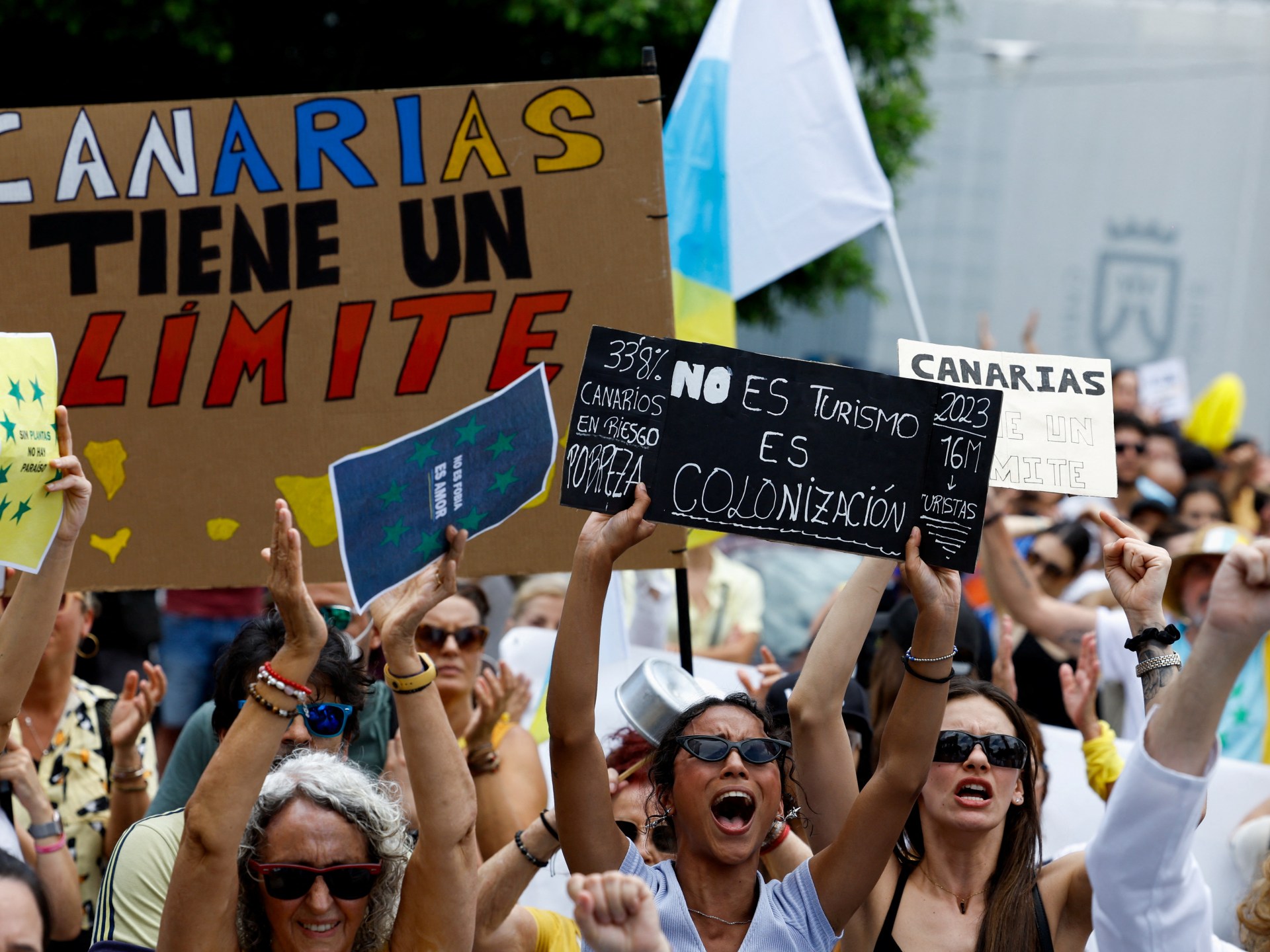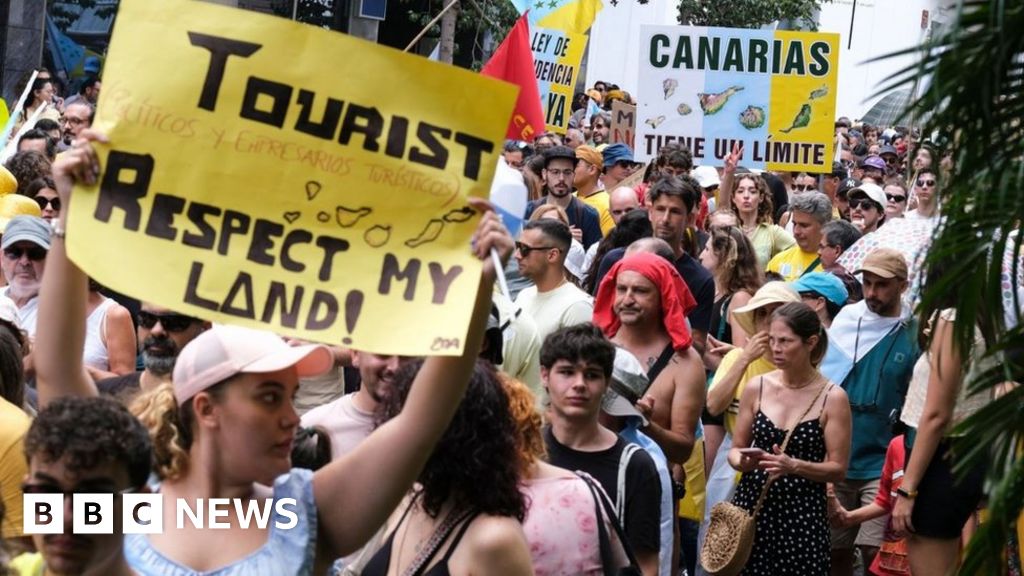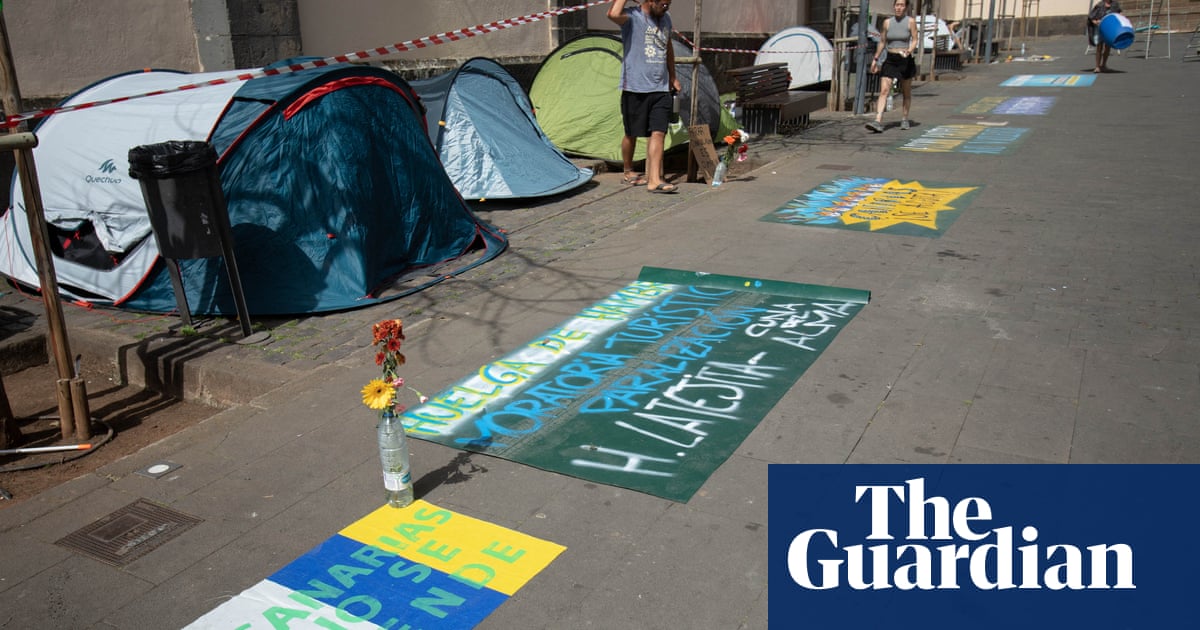
Tens of thousands of demonstrators in Spain's Canary Islands protested against overwhelming mass tourism, demanding changes to the tourism model. Approximately 57,000 people marched in various towns across the seven islands, advocating for limiting visitors, introducing an eco-tax, and halting property sales to non-residents. Protesters expressed concerns about the economic and environmental harm caused by tourist overcrowding. The archipelago, with 2.2 million residents, saw nearly 14 million foreign tourists in 2023, prompting worries about the impact on the local population.

Protesters in Argentina clashed with authorities over President Javier Milei's spending cuts, leading to arrests and the use of water cannons to disperse demonstrators. The protests were in defiance of new laws banning roadblocks, with Argentines demanding more food for soup kitchens amid austerity measures and soaring inflation. Milei's government passed measures allowing for the arrest of protesters blocking roads, with threats to withdraw social assistance. Eight protesters were charged with vandalism as clashes intensified in Buenos Aires.

A protest (also called a demonstration, remonstration, or remonstrance) is a public expression of objection, disapproval, or dissent towards an idea or action, typically a political one. Protests can be thought of as acts of cooperation in which numerous people cooperate by attending, and share the potential costs and risks of doing so. Protests can take many different forms, from individual statements to mass political demonstrations. Protesters may organize a protest as a way of publicly making their opinions heard in an attempt to influence public opinion or government policy, or they may undertake direct action in an attempt to enact desired changes themselves. When protests are part of a systematic and peaceful nonviolent campaign to achieve a particular objective, and involve the use of pressure as well as persuasion, they go beyond mere protest and may be better described as civil resistance or nonviolent resistance.Various forms of self-expression and protest are sometimes restricted by governmental policy (such as the requirement of protest permits), economic circumstances, religious orthodoxy, social structures, or media monopoly. One state reaction to protests is the use of riot police. Observers have noted an increased militarization of protest policing in many countries, with police deploying armored vehicles and snipers against protesters. When such restrictions occur, protests may assume the form of open civil disobedience, more subtle forms of resistance against the restrictions, or may spill over into other areas such as culture and emigration.A protest itself may at times be the subject of a counter-protest. In such cases, counter-protesters demonstrate their support for the person, policy, action, etc. that is the subject of the original protest. Protesters and counter-protesters can sometimes violently clash. One study found that nonviolent activism during the civil rights movement in the United States tended to produce favorable media coverage and changes in public opinion focusing on the issues organizers were raising, but violent protests tended to generate unfavorable media coverage that generated public desire to restore law and order.

The Canary Islands (, Spanish: Canarias, Spanish: [kaˈnaɾjas]), also known informally as the Canaries, are a Spanish autonomous community and archipelago in Macaronesia in the Atlantic Ocean. At their closest point to the African mainland, they are 100 kilometres (62 miles) west of Morocco and the Western Sahara. They are the southernmost of the autonomous communities of Spain. The islands have a population of 2.2 million people and are the most populous special territory of the European Union.The seven main islands are (from largest to smallest in area) Tenerife, Fuerteventura, Gran Canaria, Lanzarote, La Palma, La Gomera, and El Hierro. The archipelago includes many smaller islands and islets, including La Graciosa, Alegranza, Isla de Lobos, Montaña Clara, Roque del Oeste, and Roque del Este. It also includes a number of rocks, including Garachico and Anaga. In ancient times, the island chain was often referred to as "the Fortunate Isles". The Canary Islands are the southernmost region of Spain, and the largest and most populous archipelago of Macaronesia. Because of their location, the Canary Islands have historically been considered a link between the four continents of Africa, North America, South America, and Europe.In 2023, the Canary Islands had a population of 2,236,013, with a density of 299 inhabitants per km2, making it the seventh most populous autonomous community of Spain. The population is mostly concentrated in the two capital islands: around 43% on the island of Tenerife and 40% on the island of Gran Canaria.The Canary Islands, especially Tenerife, Gran Canaria, Fuerteventura, and Lanzarote, are a major tourist destination, with over 12 million visitors per year. This is due to their beaches, subtropical climate, and important natural attractions, especially Maspalomas in Gran Canaria and Mount Teide (a World Heritage Site) in Tenerife. Mount Teide is the highest peak in Spain and the 3rd tallest volcano in the world, measured from its base on the ocean floor. The islands have warm summers and winters warm enough for the climate to be technically tropical at sea level. The amount of precipitation and the level of maritime moderation vary depending on location and elevation. The archipelago includes green areas as well as semi-desert. The islands' high mountains are ideal for astronomical observation, because they lie above the temperature inversion layer. As a result, the archipelago boasts two professional astronomical observatories: the Teide Observatory on Tenerife, and Roque de los Muchachos Observatory on La Palma.In 1927, the Province of Canary Islands was split into two provinces. In 1982, the autonomous community of the Canary Islands was established. The cities of Santa Cruz de Tenerife and Las Palmas de Gran Canaria are, jointly, the capitals of the islands. Those cities are also, respectively, the capitals of the provinces of Santa Cruz de Tenerife and Las Palmas. Las Palmas de Gran Canaria has been the largest city in the Canaries since 1768, except for a brief period in the 1910s. Between the 1833 territorial division of Spain and 1927, Santa Cruz de Tenerife was the sole capital of the Canary Islands. In 1927, it was ordered by decree that the capital of the Canary Islands would be shared between two cities, and this arrangement persists to the present day. The third largest city in the Canary Islands is San Cristóbal de La Laguna (another World Heritage Site) on Tenerife.During the Age of Sail, the islands were the main stopover for Spanish galleons during the Spanish colonisation of the Americas, which sailed that far south in order to catch the prevailing northeasterly trade winds.

Protesters in Chilpancingo, Mexico, set the state government building and at least a dozen cars on fire. They demand answers about 43 missing students from 2014 and a student killed in March. The Guerrero state government condemned the violence and investigations are ongoing. Images show vehicles ablaze and the governor's office ransacked. The protesters are from the Ayotzinapa teachers college known for radical demonstrations.

Tens of thousands protested in Budapest against Hungarian Prime Minister Viktor Orban's government, led by former insider turned critic Peter Magyar, aiming to unite conservative and liberal Hungarians. The demonstration marked a push for a new political community to challenge Orban's governance. Magyar, known for whistleblowing on government affairs, emphasized reclaiming Hungary for a sovereign, modern, European state. Protesters demanded Orban's resignation, with many wearing national colours distinct from Orban's party symbolism. The event highlighted discontent with Orban's leadership and political opposition challenges.

Protesters gather outside the Israeli parliament demanding a ceasefire deal with Hamas and early elections following the government's security failure in the October Hamas-led attack. Prime Minister Benjamin Netanyahu's government faces criticism over the handling of the situation. The war on Gaza has resulted in significant casualties, with a truce in November leading to the release of hostages in exchange for Palestinian prisoners. Talks on a new ceasefire and captive exchange were set to begin in Cairo. Demonstrators express frustration with Netanyahu's leadership and vow to continue the protest.

Protesters in Bratislava formed a human chain around Slovakia's public television and radio building to oppose a government plan led by populist Prime Minister Robert Fico to take control of broadcasters. Culture Minister Martina Simkovicova's draft takeover plan, criticized by President Zuzana Caputova and others, aims to replace the current public media organization with a new council appointed by the government. Critics view this as a threat to media freedom, sparking multiple protests against Fico's policies and concerns of Slovakia aligning with Hungary's direction under Viktor Orban.

A boat with decomposing corpses, likely African migrants from Mali and Mauritania, was discovered off the coast of Brazil by fishermen in the state of Para. The boat's characteristics suggest it may have been en route to Spain's Canary Islands. The Atlantic migration route from West Africa to the EU is hazardous with boats often drifting for months, leading to dehydration and malnutrition deaths. European authorities are concerned about the spike in migration, despite efforts like the EU-Mauritania deal. Investigations are ongoing to identify the bodies and determine the cause of death.







https://www.theguardian.com/profile/samjones

https://www.facebook.com/TheSunWorldNews/

Yahoo! News

Yahoo! News

https://www.facebook.com/bbcnews

Al Jazeera

PANORA

Wikipedia

Wikipedia

PANORA

PANORA

PANORA

PANORA

PANORA